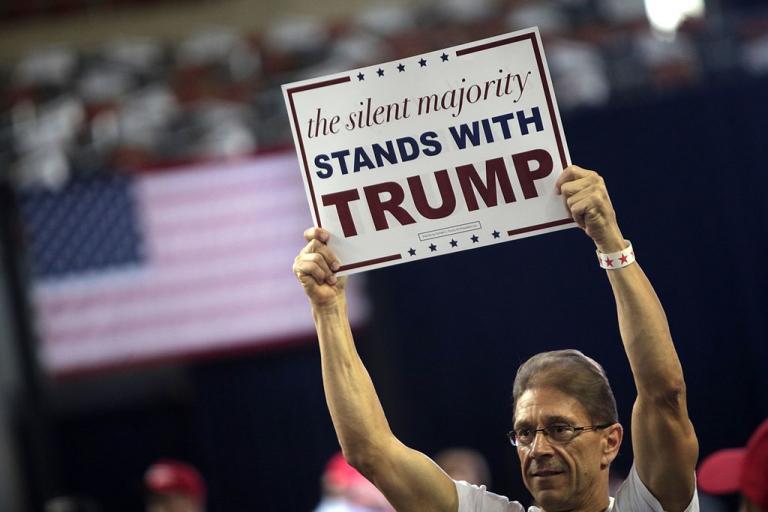Conservative Christians, especially white evangelicals, are among President Trump’s most loyal supporters. Which seems odd to many people, given his history as a womanizing casino magnate, some of his policies that critics deride as heartless, and his intemperate insulting tweets. Even though Trump has been repaying his Christian supporters by appointing conservative judges, implementing strong pro-life policies, and protecting religious liberties.
But now commentator William Saletan, writing for Slate, has written a scathing piece entitled “Trump’s Christian Apologists Are Unchristian.”
He takes off from a column by evangelical scholar Ed Stetzer, who cites data suggesting that the main reason so many Christians support Trump is not so much pro-life issues but his stance on immigration. Stetzer takes Christians to task for this and for seemingly being so uncritical of the President, even when he violates Biblical teachings, which include hospitality to sojourners and aliens. But Saletan takes it much further, insisting that evangelicals who support President Trump are not only “wicked,” but are not really Christians at all.
It’s certainly legitimate to argue about whether Christians should or should not support the President or his policies. Dr. Stetzer’s piece is of that nature. (Read it. What do you think of his arguments?) But to say that someone is not a Christian, based on a political test, goes too far. I’m not surprised when a Christian proves to be “wicked” or even to have “wicked” opinions, but being a Christian has to do with faith in Christ, who died for the wicked.
Anyway, it turns out that Mr. Saletan is not a Christian and has been an outspoken critic of Christians involved in politics, worrying about their setting up a theocracy and insisting that their religious beliefs should not be allowed to influence public policy. But now they should follow the Bible by promoting liberalized immigration? Now they should obey the Biblical principle of helping the poor by voting for Democratic, rather than Republican, solutions? I thought he didn’t want Christians acting out of their religious convictions!
Kevin Williamson raises those issues and others about Mr. Saletan’s article. In doing so, he offers a different framework for how Christians should be involved in politics that I’d like your opinion on.
From Kevin D. Williamson, “Saletan’s ‘Un-Christian’ Canard“:
I couldn’t help but think about those fair-weather fiscal hawks [who complain about government spending only when it funds programs they disagree with] when I read William Saletan charging white Evangelicals with “un-Christian” behavior in their continued support of Donald Trump. The usual religiously illiterate horsepucky is there in abundance — e.g., conflating care for the poor with political support for the current social-welfare bureaucracy and politics-powered do-goodism in general — but what interests me is the more basic assumption: Does William Saletan desire a more robustly Christian society, and a more aggressively political Christianity? Are we really caring now about who is a good Christian as a political matter? And who exactly appointed William Saletan as the pope of Evangelical Protestantism, White People Synod? . . . .
Saletan is welcome to argue that Christianity should be a cult of niceness and that it ought to be considered socially relevant to the precise extent that its doctrines can be read as coinciding with his own political preferences — which is in fact more or less what he’s doing without having the intellectual honesty to just say so. Pretending that Christianity’s failure to reduce itself to a subdivision of the progressive project somehow makes its adherents “un-Christian” is absurd.
Christians have the same legitimate right as any other group in a liberal democratic society to pursue their own political interests as they understand them. That those interests are not what Saletan wishes they were does not make them un-Christian. American Christians are obliged to operate in a secular political system, the democratic realities of which necessitate various compromises and tradeoffs. Presumably, William Saletan, denouncer of “theocratic” politicians, prefers it that way. I do not think that he or many other progressives (or libertarians, or conservatives, or Christians) would be very comfortable in a society that tried to make Christianity its organizing political principle.
Consider this sentence: “American Christians are obliged to operate in a secular political system, the democratic realities of which necessitate various compromises and tradeoffs.”
There was a time when Christian political activists focused on moral issues and on electing Christians and leaders of “good moral character” to office. That meant, in practice, supporting Republican candidates, many of whom were glad to use the Christians politically but did little to advance their interests. Now they are supporting someone who is not “one of them,” and yet he is advancing their interests.
Doesn’t this show a giving up on theocratic solutions? Isn’t it an example of working within “a secular political system,” with its required “compromises and tradeoffs”? Doesn’t this show a growing political maturity on the part of Christian political activists
Photo by Gage Skidmore from Peoria, AZ, United States of America [CC BY-SA 2.0 (https://creativecommons.org/licenses/by-sa/2.0)], via Wikimedia Commons














